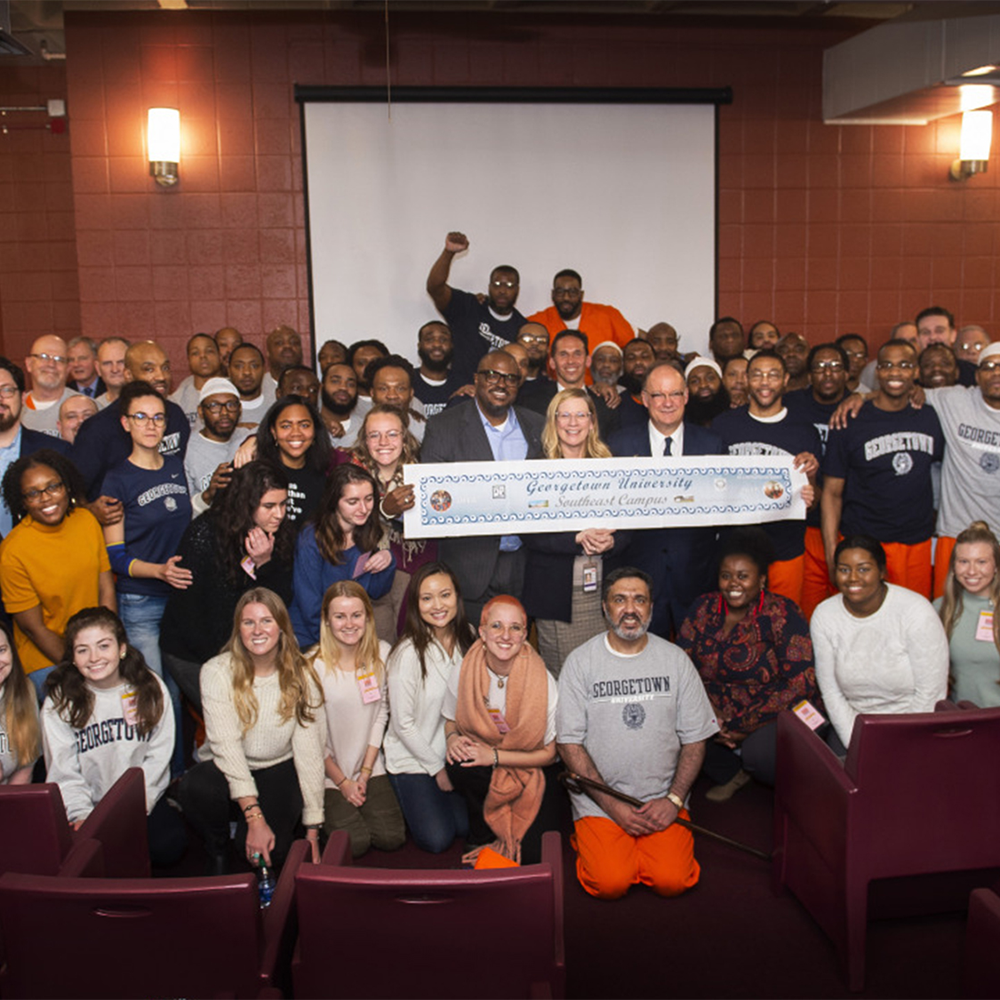Georgetown University’s Prisons and Justice Initiative has continued to expand its programs and advance its work with incarcerated people despite the challenges caused by the COVID-19 pandemic, according to its annual report released in November.
The PJI, which was founded in 2016, brings together scholars, practitioners and students to address issues related to mass incarceration. Although the COVID-19 pandemic has disrupted many of its programs, the PJI 2019-2020 Annual Report highlighted the continued growth of the institution’s team and current projects.
The consequences of the pandemic have been devastating for incarcerated people, making the initiative’s mission to tackle the problem of mass incarceration even more important, according to PJI Director Marc Howard.

“It’s been both challenging and rewarding,” Howard said in a phone interview with The Hoya. “It’s helping them get through this extraordinarily difficult phase in their incarceration right now. And that makes it worthwhile and rewarding for us.”
Many PJI programs have been revised and reduced because of the pandemic. The Prison Scholars Program, which enlists Georgetown faculty to teach credit and non-credit bearing courses in the D.C. Correctional Treatment Facility and Central Detention Facility, canceled its non-credit courses indefinitely and has switched all credit-bearing classes to a virtual environment since the spring, according to the report.
Although the D.C. Department of Corrections provided tablets for inmates to continue taking classes after the pandemic started, PJI faculty can only offer asynchronous courses because the tablets do not have web cameras, according to Howard.
“There’s some connection you can get when you can talk and see the person, but we don’t get to hear their voices, we don’t get to see their faces,” Howard said. “That’s difficult, because we miss them; we care deeply about them.”
The report also celebrated some achievements, including a $1 million grant from the Andrew W. Mellon Foundation that was awarded to PJI, in December 2019. The initiative will use the grant to fund the Prison Scholars Program’s expansion to the Patuxent Institution in Jessup, Maryland, according to the report.
Georgetown will offer incarcerated people in Patuxent the opportunity to earn a bachelor’s degree in three different liberal arts majors, PJI Director of Education Joshua Miller said in a phone interview with The Hoya.
“We’re gonna have people graduating with Georgetown degrees in basically interdisciplinary majors, that sort of shape their intellectual journey in ways that I hope come back to campus,” Miller said.
The Pivot Program is another PJI program that has continued to thrive despite the pandemic. The 10-month program is a collaboration among PJI, the McDonough School of Business and Georgetown College that offers a non-credit course in business and entrepreneurship designed specifically for formerly incarcerated people.
Some Pivot fellows have had trouble adjusting to the online learning environment as the program, the only PJI program that takes place on Georgetown’s campus, has been conducted over Zoom since March, according to Howard.
“It’s very hard to do it from the get-go virtually, particularly with people with computers — they’ve been incarcerated for a long time,” Howard said. “Some of them had no experience with computers if they had been in for a long time. But they’ve been incredibly motivated, determined and optimistic.”
Despite these difficulties, the Pivot Program is now in its third year and graduated 16 students in July.
Tyrone Walker participated in the Prison Scholars Program in 2017 when he was an inmate at the D.C. Jail. After his release from serving a nearly 25-year sentence, Walker graduated from the Pivot Program in 2019, and he still regularly corresponds with inmates in the D.C. Jail.
“They certainly miss it,” Walker said of in-person PJI classes in an interview with The Hoya. “It took their minds off the things they may be going through. They miss the interaction with their professors.”
The PJI has also continued its “Prison Reform Project” class for Georgetown undergraduates. The course, taught by Howard, takes on the cases of wrongful convictions and produces documentaries to prove innocence and aid in exoneration.
Students perform field research by traveling to the crime scene, reinterviewing witnesses and speaking with incarcerated people to produce a documentary on their case, Howard said.
PJI programs have still been valuable to incarcerated people who have otherwise lost many connections to the outside world during the pandemic, according to Howard.
“It’s really something to live for and a way to feel that the outside world still cared about them,” Howard said. “When you’re incarcerated, there’s already a feeling of abandonment and rejection by society. You feel like you’ve just been discarded, you might as well be on Mars, and our program, we support you and we believe in you which has really kept them going.”




















